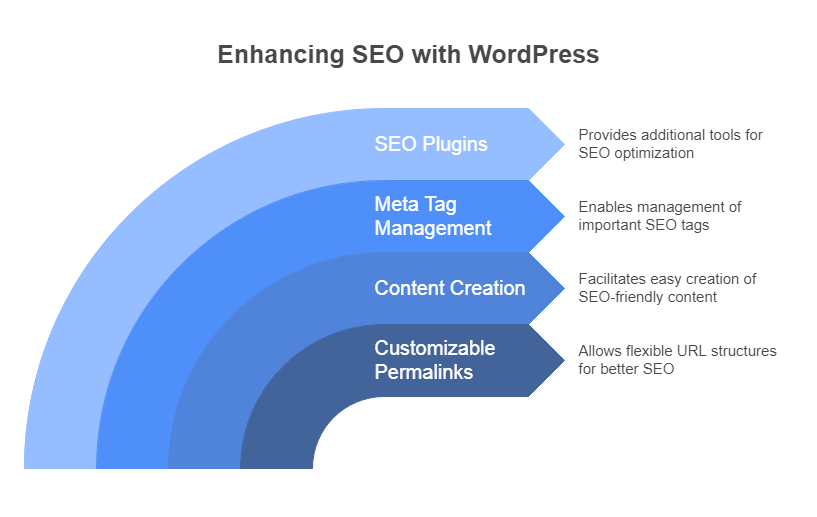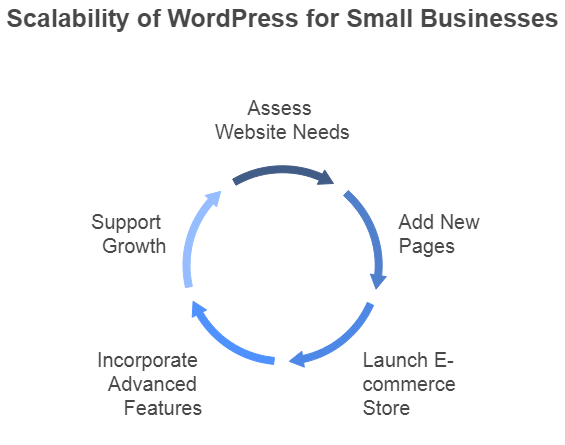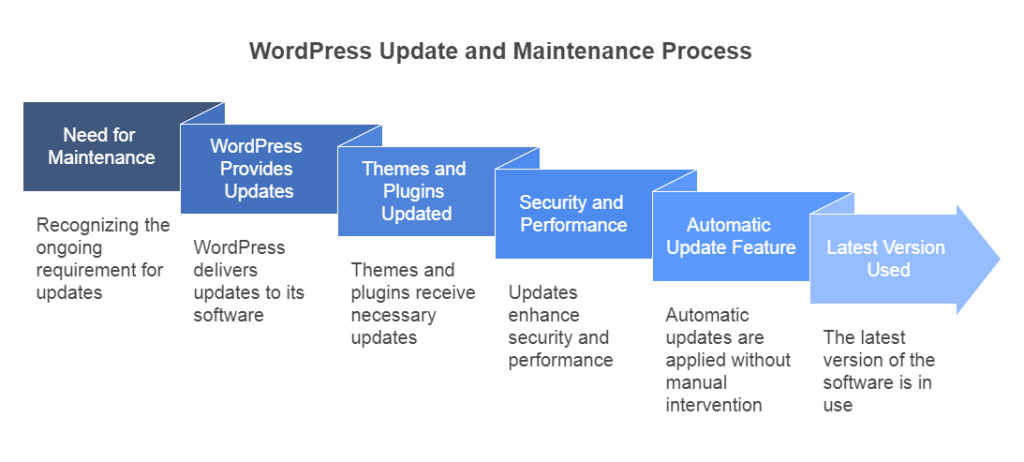Why WordPress is the Best CMS for Small Businesses: A Complete Overview

In today’s digital-first world, a robust online presence is essential for small businesses aiming to thrive. At the core of this digital presence is the Content Management System (CMS), which allows businesses to create, manage, and optimize their websites with ease. For small business owners, selecting the right CMS is a decision that impacts everything from site functionality to user experience, security, and scalability. WordPress stands out as the most popular CMS for small businesses due to its versatile features, ease of use, and cost-effectiveness. This article will explore why WordPress is the best CMS choice for small businesses in 2024 and beyond.
What is a CMS and Why Does it Matter for Small Businesses?

A Content Management System (CMS) is a software application that allows users to create, manage, and modify digital content without requiring technical knowledge of programming languages. For small businesses, a CMS is the backbone of their website, enabling them to maintain an online presence efficiently and effectively. With a CMS, businesses can streamline the content creation process, update their site regularly, and ensure that the website remains functional and competitive in the ever-evolving digital marketplace. Choosing the right CMS is crucial for small businesses as it directly influences their ability to scale, engage with customers, and implement marketing strategies.
What Makes WordPress Stand Out as a CMS for Small Businesses?
WordPress has earned its reputation as the most popular CMS in the world, powering over 40% of all websites. This supremacy is the result of careful strategy, not mere coincidence. The platform is built with small businesses in mind, offering a blend of simplicity, functionality, and scalability. Unlike other CMS platforms that may require steep learning curves or costly licenses, WordPress offers a flexible open-source solution that allows small businesses to start small and grow with ease. Its extensive ecosystem of themes, plugins, and community support makes it an ideal choice for entrepreneurs seeking to create professional websites with minimal effort.
User-Friendly Interface
One of the most compelling reasons WordPress is a favorite among small business owners is its user-friendly interface. The platform is designed to be intuitive, making it easy for users—whether they are tech-savvy or not—to navigate and manage their websites. The WordPress dashboard provides an organized layout where users can add new posts, update pages, and install plugins with a few clicks. This ease of use allows small business owners to focus on what matters most—growing their business—rather than spending time learning complex coding or web development skills.
No Coding Skills Required: WordPress Makes Website Management Easy
For many small business owners, the thought of managing a website can be intimidating, especially when coding and technical knowledge are required. WordPress removes this barrier by providing a no-code solution. With its drag-and-drop functionality, customizable themes, and user-friendly page editors like Gutenberg, even the most technologically challenged individuals can build and manage a website with confidence. This eliminates the need to hire expensive developers or rely on third-party agencies, giving small businesses complete control over their website at a fraction of the cost.
Why WordPress is the Most Popular CMS for Small Businesses Worldwide
WordPress’s widespread popularity can be attributed to its open-source nature, extensive plugin ecosystem, and active community. As an open-source CMS, WordPress is free to use, making it an affordable option for small businesses. Additionally, WordPress’s rich library of themes and plugins allows businesses to customize their websites to suit their needs, from design and functionality to SEO optimization and e-commerce features. The WordPress community further supports small businesses by providing a wealth of resources, tutorials, and forums where users can seek advice and share experiences.
Flexibility and Customization
No two small businesses are alike, and as such, the ability to customize a website is essential. WordPress offers unparalleled flexibility and customization options, allowing businesses to modify their websites according to their specific needs. With thousands of themes and plugins, small businesses can adjust the look and functionality of their sites, whether they are a retail store, a service-based business, or a blog. Additionally, WordPress supports advanced customizations for those with coding knowledge, providing a platform that can grow with the business.
Choosing the Right Theme for Your Small Business Website on WordPress
The first impression a website makes on visitors is often determined by its design, which is why choosing the right theme is crucial. WordPress offers a wide array of free and premium themes designed specifically for small businesses. These themes are customizable, responsive, and optimized for search engines, ensuring that businesses can create an aesthetically pleasing site that functions well across devices. Whether a business needs a simple one-page site or a more complex multi-page layout, WordPress has a theme to suit every business type and design preference.
The Power of WordPress Plugins
Plugins are one of the most powerful features of WordPress, allowing businesses to extend the functionality of their websites with ease. There are thousands of plugins available for everything from SEO optimization and social media integration to advanced security features and e-commerce solutions. Small businesses can leverage these plugins to improve their website’s performance, enhance user experience, and automate time-consuming tasks. Popular plugins like Yoast SEO, WooCommerce, and Jetpack provide small businesses with professional-grade tools that would otherwise be out of reach.
SEO-Friendly Features

Search engine optimization (SEO) is critical for small businesses aiming to attract organic traffic. WordPress is inherently SEO-friendly, providing features like customizable permalinks, easy content creation, and meta tag management. Additionally, there are a variety of SEO plugins that further enhance WordPress’s capabilities, helping businesses optimize their content, track performance, and improve their search engine rankings. With proper SEO implementation, small businesses can achieve greater visibility and attract a steady flow of potential customers.
How WordPress Helps Small Businesses Create Mobile-Friendly Websites
In an era where mobile traffic dominates, having a mobile-friendly website is non-negotiable. WordPress themes are designed to be responsive, ensuring that websites automatically adjust to the screen size of any device. This means that small businesses can reach customers on smartphones, tablets, and desktops without needing separate mobile sites. Responsive design enhances both user experience and search engine rankings, as Google gives precedence to mobile-optimized websites in its search results.
Security Features
Website security is a top concern for small businesses, especially as cyber threats continue to evolve. WordPress takes security seriously, offering built-in features like automatic updates, strong password policies, and user access controls. Additionally, a variety of security plugins, such as Wordfence and Sucuri, provide enhanced protection against malware, brute-force attacks, and other security vulnerabilities. By implementing these measures, small businesses can safeguard their websites and customer data from potential threats.
Cost-Effectiveness: Why WordPress is Budget-Friendly for Small Businesses

For small businesses with limited budgets, cost-effectiveness is a primary concern when choosing a CMS. WordPress’s open-source nature means that the platform itself is free to use. Small businesses only need to invest in web hosting and domain registration, making it an affordable solution compared to proprietary CMS platforms. Additionally, WordPress’s extensive library of free plugins and themes allows businesses to add functionality without incurring additional costs. This low-cost entry point enables small businesses to build and maintain professional websites without breaking the bank.
The Role of WordPress in E-Commerce
WordPress, through its plugin WooCommerce, has become a leading platform for small businesses looking to establish an online store. WooCommerce is a robust e-commerce solution that integrates seamlessly with WordPress, allowing businesses to sell products and services online. With features like inventory management, secure payment gateways, and customizable product pages, WooCommerce provides small businesses with the tools they need to run a successful online store. Additionally, the vast array of e-commerce plugins available for WordPress helps businesses further enhance their online shopping experience.
WordPress Hosting
While WordPress is a powerful CMS, its performance is largely dependent on the quality of web hosting. Small businesses need to choose a reliable hosting provider that offers fast loading speeds, secure servers, and excellent customer support. WordPress recommends several hosting providers that specialize in WordPress hosting, including Bluehost, SiteGround, and WP Engine. These providers offer optimized environments for WordPress, ensuring that small businesses can experience fast, reliable, and secure website performance.
Scalability: Expanding Your Small Business Website Using WordPress

As small businesses grow, so too do their website needs. WordPress is inherently scalable, allowing businesses to expand their websites as required. Whether adding new pages, launching an e-commerce store, or incorporating advanced features, WordPress’s flexible structure supports growth without the need to switch platforms. This scalability ensures that small businesses can continue to use WordPress as they evolve and expand their online presence.
How WordPress Integrates with Social Media for Increased Engagement
Social media integration is essential for small businesses looking to expand their reach and engage with customers. WordPress makes it easy to connect websites with social media platforms through plugins and built-in features. Small businesses can automatically share new content on their social media channels, display social media feeds on their website, and enable social sharing buttons for visitors. These integrations help increase engagement, drive traffic, and improve the overall user experience.
WordPress as a Blogging Platform
Content marketing is an effective strategy for small businesses to engage with their audience, and WordPress excels as a blogging platform. With its simple yet powerful blogging tools, WordPress makes it easy to create and manage blog posts. The platform supports rich media, SEO optimization, and scheduling, enabling small businesses to publish high-quality, engaging content regularly. By leveraging WordPress’s blogging capabilities, small businesses can attract and retain customers, build authority in their industry, and drive organic traffic to their websites.
The WordPress Community
One of the most valuable resources of the WordPress platform is its vibrant and supportive community. With millions of users, developers, and designers worldwide, the community offers a wealth of resources, including forums, tutorials, and plugins. Small businesses can tap into this extensive support network to troubleshoot issues, learn best practices, and discover new tools to enhance their website. Additionally, WordPress meets the needs of non-technical users by providing a range of beginner-friendly guides, ensuring that small business owners can access the help they need.
Real-Time Updates and Maintenance

Maintaining a website is a continuous process that requires regular updates and maintenance. WordPress simplifies this by providing real-time updates to its core software, themes, and plugins. These updates ensure that small business websites remain secure, perform well, and stay aligned with the latest web standards. Moreover, WordPress’s automatic update feature ensures that businesses are always using the latest version of the software without having to manually install updates, reducing the risk of vulnerabilities.
Case Studies: Small Businesses That Have Thrived with WordPress
Many small businesses have experienced significant success thanks to WordPress’s versatile features. From local coffee shops to global e-commerce brands, WordPress has empowered entrepreneurs to launch and grow their businesses online. By exploring case studies, small business owners can learn how WordPress helped others build professional websites, improve SEO, and achieve long-term growth. These real-world examples illustrate the potential of WordPress as a tool for small business success.
Final Thought
In conclusion, WordPress remains the top choice for small businesses in 2024 due to its user-friendly interface, flexibility, affordability, and robust features. Whether a business is just starting out or looking to scale, WordPress offers the tools and resources needed to succeed in the competitive digital landscape. As the digital world continues to evolve, WordPress’s open-source nature, active community, and constant improvements make it the best CMS option for small businesses looking to thrive in 2024 and beyond.





